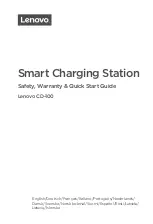
Absorption :
PWM charges to 100%.
The terminal voltage is kept constant at set level. Battery
charger delivers current pulses to the battery in varying pulse periods. When the rise time of pulses
decreases to a set value, charger switches to Float Mode. The maximum total charging time of Bulk
and Absorption is 40 hours at which the charger will shut down.
Float
:
PWM maintenance charging and cycle charging
In this mode the charger does not deliver current when battery voltage is above 12.8V. When battery
voltage drops below 12.8V battery charger will deliver small current until the battery voltage rises to
about 13.6V.
When the battery voltage drops further to about 12V, the charger will start a new charging cycle of
Bulk, Absorption and Float .
This is to insure that the battery will not be overcharged and will be kept fully charged.
The charger can be connected to a battery for months at a time without over charging it.
Check Mode and Desulphate Charging
The desulphate charging can recondition only slightly sulphated battery.
A. If “Check Mode” indication is on longer the charger is in desulphate charging. After a period of
time if desulphation of the battery is successful the charger will switch to normal charging and the
“Check Mode” will cease.
B. If Desulphate Charge Mode fails to recondition the battery the “Check Mode” will blink.
The battery should be replaced.
The maximum desulphate charging time is 8 hours.
Check Mode and Unchargeable battery
A. If the Check Mode blinks before or after pressing the Mode button then the battery is not suitable
for charging. Check the battery connections and clean the battery terminals to confirm that the
battery is not suitable for charging.
B. The Check Mode also blinks after 40 hours in Bulk and or Absorption Stage charging until battery
is removed. This safety time feature is to avoid charging faulty battery which cannot hold charge.
Thermal Protection control
The charger will decrease bulk charging current at high temperature and if temperature still increases
above a set safety value the charger will shut down.
Alarm and Faults
Blinking Alarm indicates faulty connections or charge condition. Once the fault has been corrected
battery charger will continue to operate normally.
A. Wrong connection of Positive and Negative terminal will cause “Alarm” to blink.
B. Shorting the output cable terminals (crocodile clamps or ring connectors)
C. Over Temperature Protection has been activated and charging has stopped. Unplug charger until
temperature cools down .
Interrupting the charging process
When there is a power outage, the battery charger will resume charging at its last selected Charging
Mode (motorcycle, car, snow) upon the return of mains AC power.
The charger automatically completes the charging process when the charging end voltage is reached
and switches to float / maintenance charge mode.























